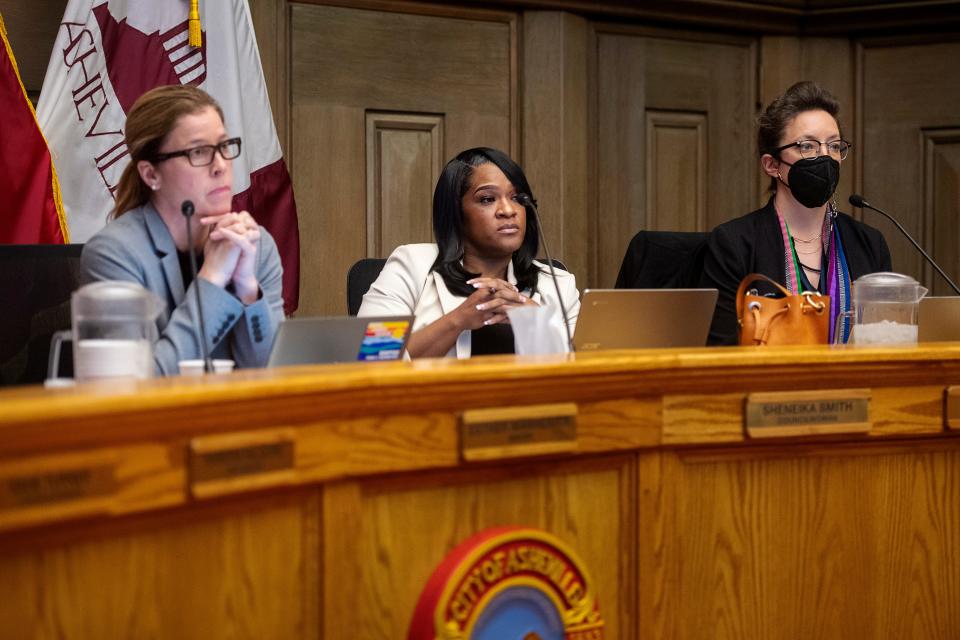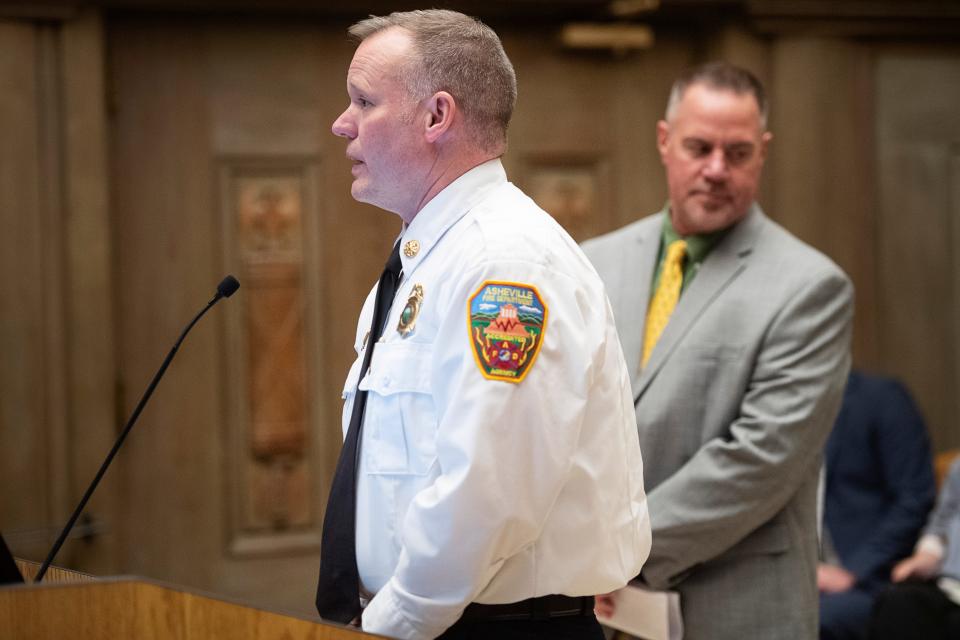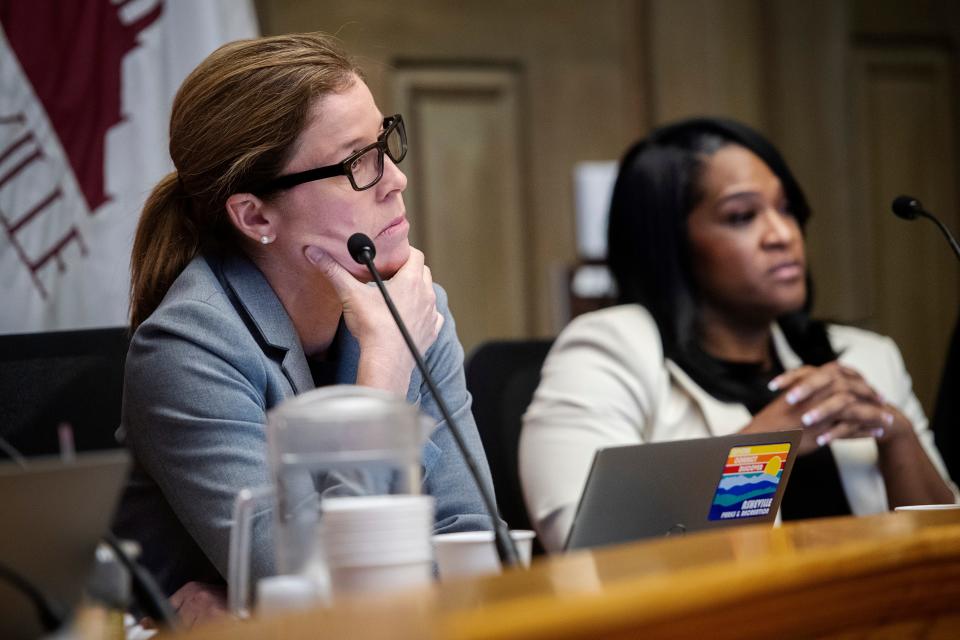Asheville water outages, 1 year later: What's been done after thousands went without water
ASHEVILLE - In what felt like an "eerie repeat" of another major holiday nearly a year prior, residents in dozens of homes on Beaucatcher Mountain woke up Thanksgiving morning without water. A main near Town Mountain Road had burst.
Though the scale was much smaller and the intermittent outages much shorter, it felt like an omen. For some, it ignited fears of the coming winter, which to that point, had been largely mild. But when temperatures inevitably drop, some people wondered, would the city be able to weather the storm?
People don't tend to think much about water until they are faced with a twist of the faucet and a few gasping sputters before the water dissipates entirely.
"Bad bill or bad break," is what they say in the industry, said WaterPIO president Mike McGill. That's when people think about water access. Otherwise, it's "out of sight, out of mind."
But a year ago, unprecedented water outages shocked the city. The impacts spilled outward to Buncombe County and beyond, and water — or the lack of it — was on everyone's mind. The crisis left thousands without water, though the full scale is still unknown, beginning with a Christmas Eve cold snap and lasting into the new year.

Since the holiday outages, the long-term response has been sprawling, if not scattered: An internal after action report, which went public in April; a 70-page deep dive by an independent review committee, which produced 37 specific recommendations, was released in June; several presentations to Asheville City Council; a matrix of ongoing and completed work; and a spotlight on an issue central to city infrastructure.
It's meant more scrutiny around water than the city has likely ever seen, Water Resources Director David Melton told the Citizen Times Dec. 21.
“As long as you go to the tap and turn it on and water comes out, you really probably don't think about it until you get the bill,” he said.
That changed last Christmas. Now, he said, increased awareness is a goal moving forward: "Let people know we're here. We are working for you every day, and there are staff out there right now doing things to make the system better and more resilient."
In the last year, Melton said his staff has dedicated efforts to cold-weather mitigation at treatment plants — like insulating chemical feed lines, adding heat tape, replacing air relief valves and creating redundancies. The department bolstered staffing, held ongoing emergency response training and began to implement the slew of recommendations from the Independent Review Committee.
The work is far from over. Intermittent outages are inevitable, Melton said, but once there is a leak, the department is putting methods into place that will improve response, help isolate the issue and "limit exposure to customers."
So far, Christmas has come and gone without any significant outages, said Clay Chandler, the new spokesperson for the city's Water Resources Department. His hiring was also part of the crisis response after the city's communication during the outages was heavily scrutinized.
What happened last winter?
As part of its findings, the nine-member Independent Review Committee, of which McGill was a part, concluded the magnitude and duration of the event was "largely avoidable and preventable."
McGill is based in Hampstead, outside of Wilmington. His firm, launched in 2017, provides public communication planning to water and wastewater utilities in more than a dozen states.
McGill said Asheville's situation was "unique." Taken alone, many of the things that went wrong could have been dealt with — but occurring together, over the Christmas holiday, combined with poor communication, it created a "crisis of public confidence."
As communication failings collide with operational issues, "that's where we see problems explode."
But despite a challenging confluence of factors, the crisis had its "basic roots" in problems that, once solved, will help protect customers moving forward, McGill said. From his perspective, that work is already underway.

Outages began with problems at the Mills River water treatment plant, which started experiencing issues Dec. 24, 2022, predominately caused by cold temperatures. A series of important, and often large, breaks across the system complicated matters further. Issues were exacerbated by a mistakenly closed valve of some significance in the River Arts District and breakdowns in communications to the public.
Melton is often asked to describe, in simple terms, what happened. The short answer, he said, is that the system, which serves around 160,000 people daily, had more water going out than they could put back in. Typically it operates well below capacity.
More: Are you ready for winter weather in Western North Carolina? Here's our checklist
“It was almost like a perfect storm,” he said. Over the about 10 days, the city would repair a total of 27 waterline breaks, many on larger distribution lines. Private line breaks were also numerous. After frozen chemical lines compromised the Mills River plant, it was taken offline Dec. 24, and remained out of service for four days.
Cascading events left thousands of customers in the south and west with no water or low water pressure. Eventual system recovery was slow.
There's no "100%" assurance an outage of such scale won't happen again, Melton said. "But (with) the steps we're taking, we're in a lot better position than we were last year."
The 'human problem'
It wasn't until Jan. 2, according to the committee's report, that crews found a closed 24-inch valve in the River Arts District that had been significantly slowing recovery.
If you ask Dirt Murphy, the story starts here: with the valve. But not on Christmas Eve. Rather, a year earlier, in January 2022.
Murphy was a member of the Independent Review Committee. She's the co-owner and farm manager of a small urban farm in West Asheville. Earlier in her career, she worked in an aquatic toxicology lab. At the time of the outages, Murphy was involved with two farmers' markets, one in Leicester and the other in Enka-Candler. Through that work, she saw the way the impacts rippled out.
"Alarm bells" started sounding for her when she heard about struggles area farmers were having caring for livestock. It went beyond families forced to buy gallons of drinking water to brush teeth, cook and flush toilets, which was already bad enough.
“This was very quickly becoming life or death issues for livestock," Murphy said. “That to me was a major warning."
The committee's work was carried out in three subcommittees: water systems/operations, communications and emergency response. Murphy sat on all of them.
“Things were very much a human problem,” Murphy said.
She pointed to the issue of the closed valve. Per the committee's report, Water Resources staff suspected in 2021 or earlier that a "system anomaly," like a closed valve, may have existed in the area. They requested engineering firm Hazen and Sawyer look into it. The firm presented findings in January 2022, even recommending where to look for a possible closed valve.
According to the report, the Water Resources team looked for a valve, but did not find it.

“That was a human error in communication that kind of started the whole thing, if you think about it," Murphy said. When outages began, there was a desire to fix the problem without panicking anyone, she said. Without the correct emergency response, and with elected officials moving in to fill gaps, things spiraled.
“It all boiled down to lapses in human judgment that just kind of snowballed into one really ugly mess over the course of about a week and a half,” Murphy said.
What has been done?
Murphy emphasized several recommendations from the report, including: needed emergency operations training, which the city has addressed with its new Emergency Operations Plan and quarterly table-top exercises; improved communication, including the hiring of a dedicated spokesperson for the department; and consideration of creating a Water Utility Advisory Panel.
"Even when it hurt" Murphy said she felt the city and its leaders were receptive to the recommendations. She agreed with McGill that steps were being made to implement them, even if there are elements she would like to see move faster.
While no one she knew in her West Asheville neighborhood lost water, people on the other side of Patton Avenue did. That was part of the complications identified by the committee: One person would have water, and their neighbor wouldn't. The situation was nearly impossible to comprehensively gauge.
While not uncommon for most water utilities, it would be possible to better understand the scope with a fully implemented Advanced Metering Infrastructure. Though Asheville City Council approved $30 million in funding in July 2022 for this project, it had only barely begun at the time of the outages. The committee recommended accelerating this effort.
As of December, the city reports the project is 7% complete. Completion is estimated for 2025.
Training was a major focus of a Dec. 7 briefing to council, led by Assistant City Manager Ben Woody. It's the most recent public-facing review of progress since the recommendations were delivered six months prior.
“A tremendous amount of work has been done by the staff in those six months, because we know how important it is and how key it is to be prepared as we move into the holiday season again and cold weather,” Woody said.
Many of the recommendations are complete, and all are at least underway.
There was little council discussion during the presentation, though council member Antanette Mosley asked about dedicated training for elected officials, also among the committee's recommendations.

Assistant Fire Chief Jeremy Knighton said "deliverables are coming" in the form of an elected official guide to the city's Emergency Operations Plan. He said it will be a central part of training and preparedness moving forward.
This is necessitated after the report found council members "injected themselves" into communications and operational responses, which McGill said is not a best practice.
Rather than these decisions coming at the hands of elected officials, McGill said, the city should implement communication practices laid out in the Incident Command System training program, which places responsibility on an incident commander and public information officer, rather than anyone else.
Is Asheville prepared for cold weather?
Melton said he feels the department is ready with an "intentional response" for crises that may emerge. Many major capital projects are incoming, which could mean rate increases, as well as new staff, like a dedicated valve crew and request for an additional water production engineer.
Heading into the season's coldest weather, he said Asheville is equipped with a more prepared system, and he feels confident that they can aptly respond to any outages that arise.
"Honest communication is what will hopefully restore that (public) confidence that we seek," Melton said.

McGill said the city was already improving its communication efforts ahead of the committee report, and he sees some "early wins" on the infrastructure side. However, he cautioned that the work is not always quick or easy.
"It will take time for them to work through all of the recommendations," he said. "You can’t wave a magic wand with infrastructure, you just can’t.”
Like Murphy, he said the city staff was "incredibly responsive" to the committee.
“There are good people working with that water system that are doing the best they can with the resources they have. They need more resources. They need more training. They need better processes. And I think we are seeing that take shape," McGill said.
“You are far better off this year than you were last year, given what you’ve gone through. And you’ll be better off for years to come."
'Can we get this fixed?'
On Thanksgiving day, the city was responsive. Employees took early morning calls, said LeeAnn Donnelly, among the residents impacted by the intermittent outages on Beaucatcher Mountain. The problem was fixed later that morning.
But come that Sunday, water was out again.
"Given the drama about the city’s water system, and the failures and miscommunications surrounding the Christmas 2022 mess, many of us are nervous about the coming winter," Donnelly said in an email to the Citizen Times. "I was fortunate last year to be out of water only for about a day. Others went days without."
By the time she spoke with the Citizen Times Nov. 27, water was back on for good. Chandler, the new department spokesperson, confirmed that crews responded to a water main break over the holiday and had restored service to every connection around 7 that morning.
"Repairing the break was complicated by its location near a pump station, where water pressure is higher than other areas," Chandler said in November. "Fewer than 800 connections experienced intermittent service interruption."
Donnelly said the city handled it quickly and were communicative, but it was still a shock to have it happening again: another holiday morning dawning without water.
“We’ve got to get it together. … We’re a growing city, and our infrastructure needs to grow along with it," she said. “It seems we’ve had problems. ... Can we get this fixed?”
Without reliable water, McGill said, a community can't function. More emphasis must be put on making systems stronger, not just Band-Aiding issues as they arise.
“It’s the backbone for everything we do every day," he said. "You can’t have a functioning society if you don’t have reliable water and wastewater services, it just doesn’t work. People will go elsewhere."
More: Asheville Council OKs new housing developments near Biltmore Village and Lake Julian
More: Asheville City Council considers 2024 GO Bond; what's next for referendum process?
Sarah Honosky is the city government reporter for the Asheville Citizen Times, part of the USA TODAY Network. News Tips? Email shonosky@citizentimes.com or message on Twitter at @slhonosky. Please support local, daily journalism with a subscription to the Citizen Times.
This article originally appeared on Asheville Citizen Times: 1 year later: Experts reflect on the holiday Asheville water outages

